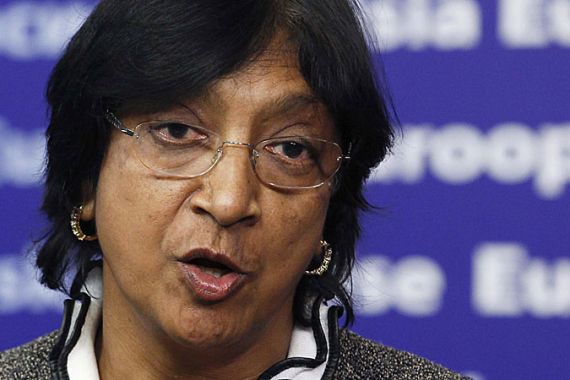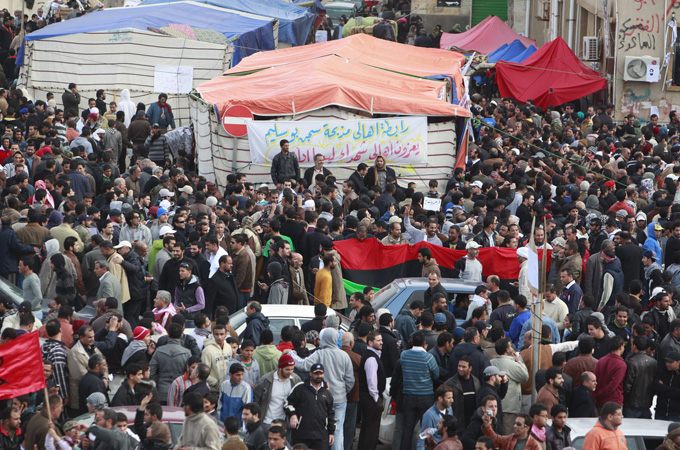UN rights body urges Libya action
Leaders urged to “step in vigorously” to end bloody crackdown, while envoy says Libyan mission to Switzerland has quit.

 |
| The UN Security Council has already called on Libya for an immediate end to violence against protesters [Reuters] |
The United Nations’ top human rights official says reports of mass killings in Libya should spur world leaders to “step in vigorously” to end the violent crackdown in Libya, and that the 47-nation body should use “all means possible”.
Friday’s session is the first time that the UN Human Rights Council has held a special session to discuss actions against one of its members, with Navi Pillay, the UN High Commissioner on Human Rights, giving support for an independent panel to investigate the alleged abuses by Libyan security forces.
“Today’s brutal and shocking situation is the direct outcome of a callous disregard for the rights and freedom of Libyans that has marked the almost four-decade long grip on power by the current ruler,” she said.
“Any official, at any level, ordering or carrying out atrocities and attacks can be held criminally accountable.”
Nick Spicer, Al Jazeera’s correspondent in Geneva, said the commissioner questioned if there had been crimes against humanity taking place, terminology which would set the legal framework for any future action.
Meanwhile, the Libyan envoy to the UN told the session on Friday that the mission in Switzerland had quit, and employees at the embassy now “represent the Libyan people”.
Tripoli’s ambassadors to France, Portugal and to the UN cultural and education organisation (UNESCO), also resigned on Friday, adding to the growing number of diplomats quitting over the crisis.
NATO also issued a brief statement, saying they would “continue to monitor the situation in coordination with other international organisations”, and would be prepared “for any eventuality”.
Tim Friend, reporting for Al Jazeera from outside NATO headquarters in Brussels, said that much of what the military organisation is capable of – such as providing troops – would have to be sanctioned by the UN before any action coud take place.
The developments come hours before a UN Security Council in New York meeting that will consider actions, including sanctions, against the government of Muammar Gaddafi.
David Cameron, British prime minister, warned Libyan authorities “the world is watching you, and the world will hold you to account”.
“International justice has a long reach, and a long memory,” he said.
Muslim condemnation
European nations have led the call for a UN-led investigation into possible war crimes and the use of sanctions against Libya.
France has already urged the body to approve a draft resolution that calls for a “total arms embargo, sanctions and asking the International Criminal Court to proceed over crimes against humanity”.
Guido Westerwelle, the German foreign minister, said his country was also preparing sanctions, including travel bans and asset freezes on Gaddafi’s family, but dismissed economic sanctions on the country as a whole.
Britain’s prime minister discussed the possibility of “multilateral measures” against Libya with Barack Obama, the US president, earlier in the week.
China and Russia, traditionally reluctant to interfere in the internal affairs of other countries, have supported a statement from the security council issued on Tuesday that condemned “the repression against peaceful demonstrators,” and demanded an “immediate end to the violence”.
Charles Nduka Onianwa, Nigeria’s ambassador to the UN rights council, said it was “obvious … that the indiscriminate use of force against peaceful protesters should be condemned”.
Pakistan also said the 57 members of the Organisation of the Islamic Conference “condemn the use of force”.
“Muslims will no longer tolerate inequalities and injustice,” he told the council on Friday.
“A new dawn has come. The rules of the game have changed. Those who do not embrace it will be swept away.”
However Hugo Chavez, the Venezuelan president, appeared to write on social networking site Twitter that the Libyan unrest was a “lesson” for right wing governments in the West.
“Long live libya. Long live the independence of Libya,” he wrote, saying Gaddafi faced a civil war.
Possible next steps
Mark Lyall Grant, Britain’s UN ambassador, said on Thursday that members to the body must look at possible next steps after Gaddafi failed to heed the Security Council’s demand to end the violence, diplomats reported.
They said possible sanctions likely to be put on the table include travel bans and asset freezes against Gaddafi and top officials in his government, an arms embargo against the government, and imposition of a no-fly zone over Libya.
Nato’s main decision-making body is also holding an emergency session on Friday to consider a response to the situation in Libya.
However, Anders Fogh Rasmussen, Nato’s secretary general, has already said the military alliance had no intention of intervening in the north African nation, and had not received any requests to do so.
He said that priority must be given to evacuation and humanitarian assistance, and that NATO could act as an “enabler and coordinator” if individual member states wished to take action.
“What’s happening in Libya is of great concern to us. This crisis in our immediate neighbourhood affects Libyan civilians and many people from Nato allies,” Oana Lungescu, a Nato spokeswoman, said.
“Many countries are evacuating their citizens, clearly this is a massive challenge,” she said.
The European Union is also weighing a range of options in response to the situation in Libya, where thousands of citizens are still trapped.